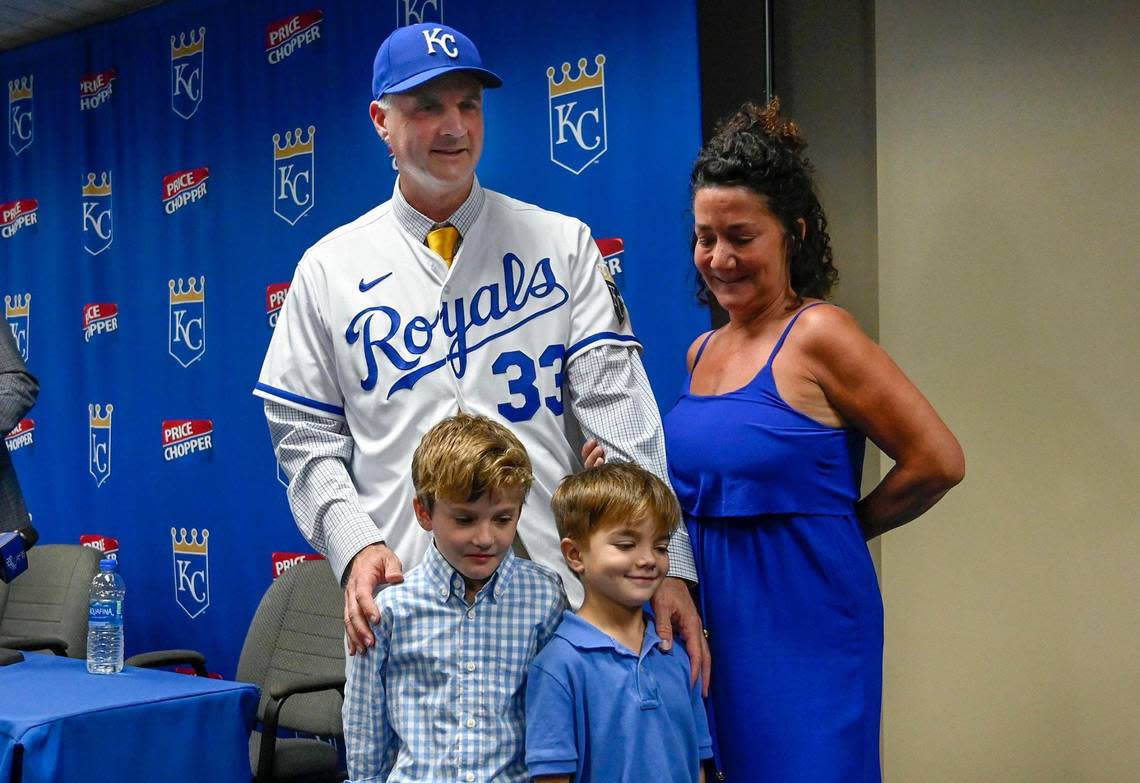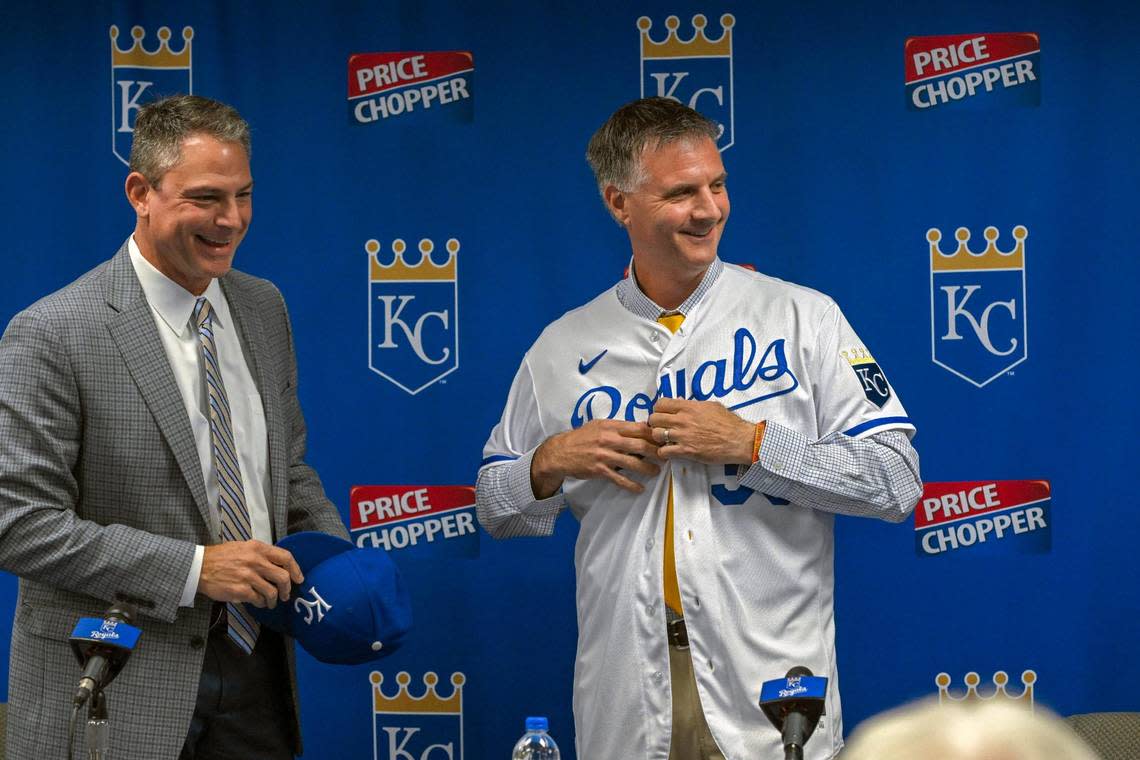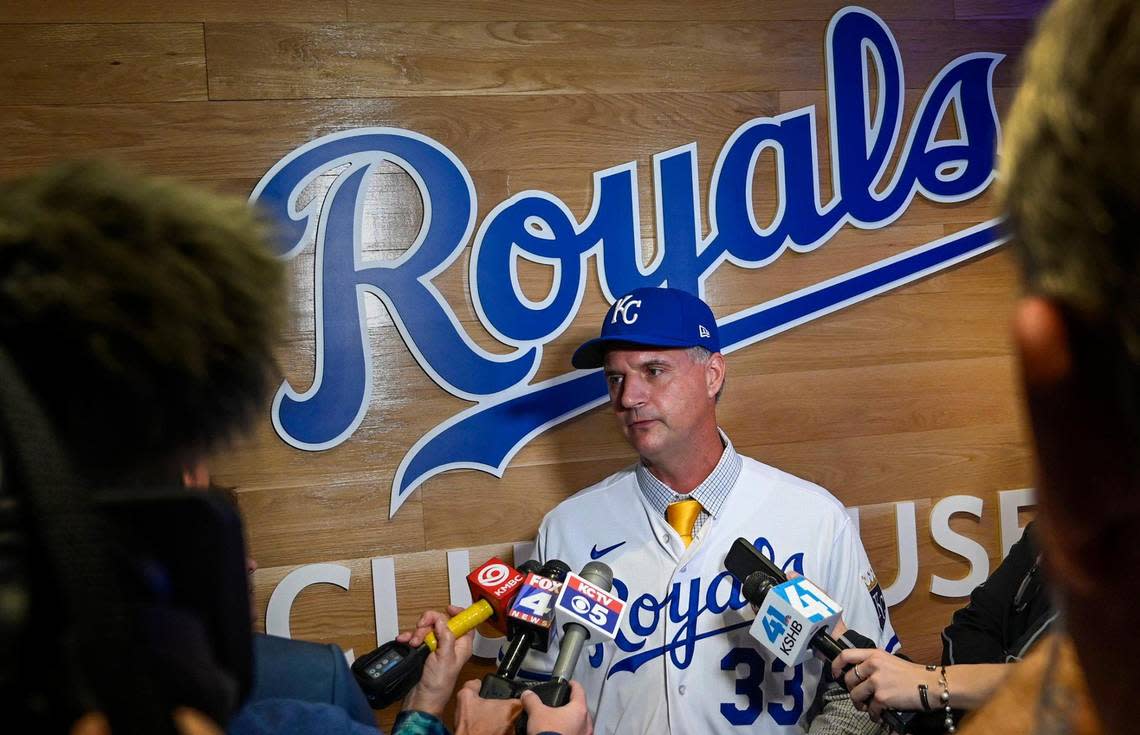Why new Royals manager Matt Quatraro will be guided by analytics but not in its thrall
The last two times the Royals hired managers, the preferred candidate already was in the organizational pipeline in the forms of former big-league managers serving as special advisors: Ned Yost (2010) and Mike Matheny (2019).
This time, the prime directive of the search that led to former Tampa Bay bench coach Matt Quatraro was to “really expand the horizon,” executive vice-president and general manager J.J. Picollo said Thursday.
As the Royals continue to essentially re-imagine their broader approach, they perceived a significant benefit to going outside for fresh perspective and voice and even to challenge their own thinking.
“It kind of pains me to say that,” said Picollo, noting a number of past organizational successes by promoting from within.
But this wasn’t about doing the more comfortable or predictable thing for the Royals, who had three internal contenders among their seven finalists for the job.
Not after they’ve lost an average of 98 games over their last four full seasons (not including the pandemic-shortened 2020 season) and stalled on a rebuild.
That’s why they undertook an expansive, elaborate and collaborative search that entailed a formulaic grading system to help determine the next manager.
The ultimate result was an inspiring and promising choice: a man steeped in winning in other small-market cities (Cleveland and Tampa Bay) and well-versed in the deployment of analytics that is increasingly baseball’s coin of the realm.
It’s telling about both the decision and what the Royals have in Quatraro, though, that the decisive data on Quatraro wasn’t necessarily derived from the grading system.
Turns out gut feelings and instinct were part of it, too, Picollo acknowledged.
“There’s a subjective piece to this,” he said after the news conference to introduce Quatraro at Kauffman Stadium.
He later added, “You feel a partnership. When it clicks, it clicks. He felt it. We felt it.”
Which brings us to Quatraro, 48, a proud son of school teachers who exuded the calm and patient demeanor of educators on a day when he also momentarily choked up looking at his wife, Chris, two young boys, George and Leo, and thought of his parents and his journey.
Speaking to a handful of reporters in the Royals clubhouse later, Quatraro thought about how his mother and father instilled curiosity, work ethic and an even keel in him.
And he thought about his days managing in the minor leagues and the bus trips through the night and all those sorts of things that “build you to who you are ... and (provide) the readiness to be here.”
Much of that readiness to be here is personability, an open mind and knacks for listening and connecting, Picollo understood through the search. And that’s all instructive about how Quatraro figures to approach the job.
“Matt (has) a great understanding of where the game has been, where it is today and where it’s going,” Picollo said. “... Somebody that has that growth mindset and intellectual curiosity that’s going to put us in a better position moving forward.”
For all his contemporary schooling in the game, though, it’s anticipated Quatraro will bring a vital human touch to the job.
Whether it’s in how he communicates with Picollo and the front office, embraces the input of all departments in the operation or in understanding the work of nurturing young players.
“He wants them to participate in their career,” Picollo said, “not tell them what their career is going to be. I think that’s going to be greatly appreciated by our current players.”
As for where analytics fits in all this?
If what the search process determined and what was discussed on Thursday were any indication, Quatraro will be well-versed and nimble with the numbers and generally a devotee. He’ll have the “ability to utilize” the more sophisticated numbers the Royals have had at hand and know what to do with them, Picollo said.
Presumably, that means more so than his predecessors.
But Quatraro isn’t going to be in the thrall of that data so much as partial to it within a broader spectrum of thinking.
Just as he wants to hear everything the analytics people have to say, he trusts he’ll also be able to say, “No, that’s wacky; let’s rework this.”
Because he rejects the narrative that you’re either an analytics person or a baseball person.
Because the data, he said, “doesn’t make the decisions. It informs the decisions, and it creates more questions that you can ask that help you make better decisions down the road.”
Or as he added later: “All of that information, all the input are kind of the guardrails. And within those guardrails, there is room for interpretation. Now, the better we feel about our process and our information, the closer those guardrails get together, and we’ll make those decisions within those parameters.
“But this game is played by human beings, and there’s a lot of emotion.”
Meaning that the right sort of collaboration might be more meaningful to the job he can do than analytics, per se, across the organization.
Especially when it comes to the Royals’ need to reset the pitching development that has been such a hindrance … and without which they’ll have little chance to get much better any time soon.
So how Quatraro incorporates analytics will be a key part, but only a part, of whether he can help revive the Royals.
Because much like the Royals had a subjective element in selecting him, he’ll be guided by the numbers but not quite captive to them as he sets about putting a personal signature on the job.



